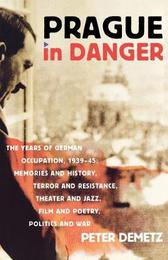
|
Prague in Danger: The Years of German Occupation, 1939-45: Memories and History, Terror and Resistance, Theatre and Jazz, Film a
Paperback / softback
Main Details
| Title |
Prague in Danger: The Years of German Occupation, 1939-45: Memories and History, Terror and Resistance, Theatre and Jazz, Film a
|
| Authors and Contributors |
By (author) Peter Demetz
|
| Physical Properties |
| Format:Paperback / softback | | Pages:288 | | Dimensions(mm): Height 223,Width 142 |
|
| Category/Genre | History |
|---|
| ISBN/Barcode |
9780374531560
|
| Classifications | Dewey:943.712033 |
|---|
| Audience | |
|---|
| Illustrations |
Illustrations
|
|
Publishing Details |
| Publisher |
Farrar, Straus & Giroux Inc
|
| Imprint |
Farrar, Straus & Giroux Inc
|
| Publication Date |
14 April 2009 |
| Publication Country |
United States
|
Description
A dramatic account of life in Czechoslovakia's great capital during the Nazi Protectorate With this successor book to Prague in Black and Gold, his account of more than a thousand years of history in the great Central European capital, Peter Demetz focuses on the six years that Prague was under German occupation in World War II: from the bitter morning of March 15, 1939, when Hitler arrived from Berlin to set his seal on the Nazi takeover of the Czechoslovak government, until the liberation of Bohemia in April 1945. Demetz was a boy living in Prague then, and here he joins his objective chronicle of the city under Nazi control with his personal memories of that period, expertly interweaving a superb account of the German authorities' diplomatic, financial, and military machinations with a brilliant description of Prague's evolving resistance and underground opposition. The result is a complex, continually surprising book filled with rare human detail and warmth, the gripping story of a great city meeting the dual challenge of occupation and of war.
Author Biography
Peter Demetz is the author of many books, including The Air Show at Brescia, 1909 (FSG, 2002) and Prague in Black and Gold (H&W, 1997). He lives in Cambridge, Massachusetts.
Reviews"Prague in Danger is a compulsive read, and very finely done. There is by now a mass of more or less analytical commentary on the Protectorate, and of course we have powerful memoirs and personal testimony. But I haven't seen the two genres combined in this way, and with such great sensitivity to the interplay of public and private. Demetz conveys very poignantly, and with sharp insight, just what it was like to live day to day in occupied Prague, and moreover to live right at the intersection of the Czech, Jewish and German spheres. He embodies exactly what was destroyed by Nazi thuggery and then by Czech vengefulness. I enjoyed too the forays into cultural history--of jazz or film, for example, or about Orten and Jesenska; and I hope that they can be appreciated, even by those who know nothing of the background, as conveying a flavour of the period and place. The politics are likewise depicted with a sure touch and sound judgment, as well as with an eye for the unfamiliar vignette, even in the case of the best-known episodes. Demetz's book should sharpen many readers' sense of the peculiar tragedy of the very last phase of the old multicultural Prague whose downfall he chronicles." --Robert Evans, Regius Professor of History, Oxford University "Demetz conveys very poignantly, and with sharp insight, just what it was like to live day to day in occupied Prague, and moreover to live right at the intersection of the Czech, Jewish and German spheres. He embodies exactly what was destroyed by Nazi thuggery and then by Czech vengefulness. I enjoyed too the forays into cultural history--of jazz or film, for example, or about Orten and Jesenska; and I hope that they can be appreciated, even by those who know nothing of the background, as conveying a flavour of the period and place. The politics are likewise depicted with a sure touch and sound judgment, as well as with an eye for the unfamiliar vignette, even in the case of the best-known episodes. Demetz's book should sharpen many readers' sense of the peculiar tragedy of the very last phase of the old multicultural Prague whose downfall he chronicles." --Robert Evans, Regius Professor of History, Oxford University "The politics are likewise depicted with a sure touch and sound judgment, as well as with an eye for the unfamiliar vignette, even in the case of the best-known episodes. Demetz's book should sharpen many readers' sense of the peculiar tragedy of the very last phase of the old multicultural Prague whose downfall he chronicles." --Robert Evans, Regius Professor of History, Oxford University "A rich and intricate story . . . [Demetz] deftly tells the legends of the city's origin . . . He deliberately avoids the sanitized and prettified guidebook approach to Prague in favor of a more somber register which acknowledges that conflicts were never far beneath the surface and could explode in the most brutal forms." --R.J.W. Evans, The New York Review of Books on Prague in Black and Gold "[Demetz] writes with the ease and authority of a man showing us his old neighborhood. He seems to be on speaking terms with the many poets, chroniclers, rabbis, and clerics who lived and wrote in Prague, and allows us to read history through their lives and words . . . Reading Demetz is more like taking a graduate course with a master teacher: You know you are in the hands of an authority." --Helen Epstein, The Boston Sunday Globe on Prague in Black and Gold
|